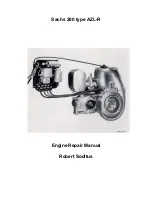
Installation, operation and maintenance instructions
High voltage flameproof motors for explosive atmosphere
AMD Rg 355-400-450-500
General maintenance and revision criteria
Issued by: MOLM
Sheet No.
3AAM101037 E
Rev. B
Page 2 of 2
01.2023
We
res
erv
e
a
ll r
ight
s i
n t
hi
s
doc
umen
t a
n
d i
n t
he
inf
or
mat
ion
cont
ain
ed
ther
ei
n. R
epr
o
duc
tion
,
us
e
of
dis
clos
ur
e
to
th
ird
part
ies
w
itho
ut
expr
es
s auth
ority
is
s
tr
ic
tly
f
or
bi
dden.
Spare parts required
The probable spare parts requirements should be
determined from the scope of work planned.
The operator’s inventory parts should be checked for
completeness and condition, in accordance with the
requirements. Any additional spare parts necessary
must be procured in good time.
Work schedule
A work schedule must be drawn up. Among other things,
it shall indicate which work is to be done in the plant
operator’s workshops and if the intervention of
manufacturer’s personnel is required.
Measurements (such as pressures, vibration, foundation
dislocation, motor temperature rise, etc.) should be taken
in good time before the start of the overhaul, in order to
establish the actual motor parameters, which shall be
compared with the design (required) values.
For scheduling the complete overhaul, it is strongly
recommended that a detailed work schedule be drawn
up, in the form of a bar chart or, even better, a critical-
path diagram. It should be noted here that by planning a
quick disassembly of the machine, an early diagnosis of
the problems and defects is possible, and this improves
the possibility of completing unforeseen work within the
allotted shut-down time.
Comments to spare parts inventory
A balanced spare parts inventory contributes
significantly to shortening the time required for both
scheduled and unscheduled outages, and hence
improves the total availability of the plant.
The question of which spare parts to stock and during
what time, is determined chiefly by:
-
their probability of failure
-
their delivery (procurement) time
-
the length of time required to repair them
According to these criteria, it is differentiated between
emergency spare parts, which should be available at the
plant even before commissioning, and parts which are
recommended for long term stocking. When one or more
operators in a given area have a number of identical
machines in operation, then it could be advantageous to
form a spare parts pool.
Reconditioning work, general
All bare components or parts thereof are to be cleaned
(see section on cleaning) and inspected for corrosion.
Any traces of rust are to be removed by brushing off, or
by using a fine grinding stone etc.
Immediately afterwards spray or paint on a generous
covering of rust protecting oil. If heavy rust is found on
the shaft (running surfaces for seals, seats and shaft
extensions), it must be removed mechanically, and the
original dimensions restored by using a suitable
resurfacing procedure and reworking.
ABB
should be
consulted for such a case.
In the case of intermediate storage periods, bare
components or parts thereof
must not come in contact
with wood or damp packing material.
Reconditioning of the bearings
Thoroughly clean off traces of oil etc. from all bearing
components (see section on cleaning).
Important!
A poorly cleaned bearing surface will
overheat and quickly wear out. A bearing surface is
only clean when a white cloth wiped over remains
white.
All raised imperfections on the surface of the babbitt
metal are to be removed with a scraper
. Do not use
emery paper or sandpaper on the white metal
surface!
Possible traces of rust or burrs on other metal faces of
the bearing parts can be removed by using a fine
grinding stone (oil stone). Repolishing will be necessary
in cases where the rust has eaten in deeply. The bearing
faces on the shaft journals must show no sign of burr
build-up. Possibly work over with a fine grinding stone
(oil stone). In the case of vertical machines with plain
bearings these faces will be the top and bottom bushings
and their locking nuts.
Immediately afterwards
coat with a rust protecting oil
(
ABB
uses BLASOL 135 from the company Blaser, CH-
3414 Haslerüegsau) or TECTYL 502 C from the
company Valvoline.
Because of the danger of corrosion, the bearing parts
must not come into contact with wood or damp
packing materials
during any periods of intermediate
storage.
















































